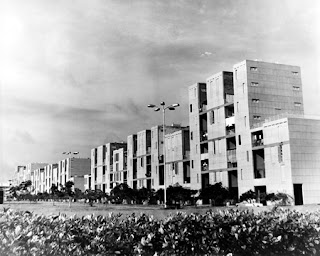Central Market in Phnom Penh
Chaktomuk Halll
Olympic Village Housing, completed in 1964 by Architect VANN Moly Vann
After the campaign for full independence in the early 1950s
was done successfully, King NORODOM Shihanouk became the hero for Khmer Nation’s
independence and development. Since countrymen needed him to develop the
country, King NORODOM Shihanouk gave up his throne to his king parents, King
NORODOM Suramarith and Queen SISOWATH Kosomak Nearyrath Serey Wathana in 1955.
Then he got involves in the development progress in Cambodia after that. He inaugurated
the new era, “Sangkum Reastr Niyum Regime”, for his people to enjoy their life
and to believe strongly within her nation.
Khmer people during that time were so happy to live and work together with the same vision towards the development of Cambodia. All citizens were respectful with each other and followed their traditional and cultural value very well; they loved Khmer movies, ancient Khmer dancing, Khmer songs, Khmer music, Khmer silk, Khmer style cloth, Khmer poem, Ayai, Yike, Lakhorn Sbek Thom & Toch, Lakhorn Sromorl, Lakhorn Bassac, Lakhorn Niyeay, and so on. They also practiced the rule for good life by learning Khmer Literature & ancient Khmer rule from previous era, obeying the law of the country, respecting the value of person, celebrating the traditional ceremony, and warmly welcoming the guest from foreign country. According to some Japanese who used to live in Cambodia in Sangkum Reastr Niyum era said that Khmer people were very polite and so friendly to them and had very good standard in living. Certainly, under the rule of King Shihanouk, people were encouraged to keep practicing their tradition and culture; not only Khmer people but other ethnic groups living in Cambodia. This kind of leadership should be learned and used by some leaders in other countries that are so bad to ethnic groups’ tradition & culture and only care about their own culture & influence on those ethnic groups. The special event of Khmer solidarity in that era was the success in International Court of Justice (ICJ) in 1962 under the leadership King Shihanouk protecting the ownership of Cambodia over ancient Khmer Temple on Dangrek Mountain Range, Prasat Preah Vihear (Preah Vihear Temple).
King Shihanouk created the economic
policy and strategy to push the development throughout the country. One
strategy was to build the strong human resource and good environment for
learning. Good educational system was seen in this period with the effort of
Cambodian student’s self-learning. Also, overseas scholarship was available for
best students to further their education, especially scholarship to study in
France. Since then, many Khmer scholars in that era were so strong and skillful
with their specialty. For example, doctors and architects were so talent to
bring the best service for her people and country. Patients were cured very
effectively by doctors since they got profound knowledge related to medical and
health issue, especially with good morality. Architects were similar to the
doctors and built giant modern architecture and building followed the good
standard with air system and tidiness. Most of those architecture and building
are still in used till today like flat in Phnom Penh & Battambang, Olympic
stadium, building along Preah Monivong Boulevards (called Business road in
Phnom Penh), etc. Plan of Phnom Penh capital today was developed by these Khmer
architects in that era and became well-known as Pearl City in South East Asia in 1950s & 1960s. They designed very good plan for this city tidily and
beautifully. Besides this, Khmer Architect also used his strong capacity in
overseas construction like Singapore airport.
King Shihanouk also developed the
light and heavy industry everywhere in the kingdom. Many factories and business
centers could be found in Phnom Penh, Battambang, Kompot, Shihanoukville,
Kandal, Kompong Cham, Pursat, Kompong Thom, Kratie, Kompong Speu, Siem Reap,
Kompong Chhnang, and so on. Most factories were owned by state, but the
government allowed the foreign company to invest like searching for oil in the
sea of Cambodia around 90,000 square kilometers, running the garment factory
and other industrial activities… Foreign companies could also invest in other
private sector like airline, bank, restaurant, hotel, etc. Sometimes,
government and private companies joined to run the factory and other services.
It should be noticed that Cambodia at this stage could build vehicles and
produce more industrial food to use within the country and export to neighbor
countries.
Furthermore, the rich natural resources of the country under the
leadership King Shihanouk brought the kingdom to be the famous and good destination for both foreign investment and tourism. Fish
production in Boeung Tonle Sap (Great Lake) was 10 tons per square kilometers,
the most famous non-salty fisheries in the world. Forest covered the country
over 73% of total land size. Khmer people served in the airline service
dressing the good professional cloth to welcome all guest locally and
internationally. Ports of Shihanoukville and Phnom Penh were very busy with the
import & export activities. The well-known partner for economic cooperation
was France. Specifically, King Shihanouk considered the water irrigation system
as the most effective way to better the agricultural activities with high
production capacity. Another point for the best achievement of Sangkum Reastr
Niyum regime was the strong cooperation with foreign country for both political
and economic purposes. However, this achievement got an ending gradually since
the end of 1969 until the early 1970 because of involvement and support of
Cambodia for Viet Cong Troops (North Vietnam) in Vietnam War with the United
States. “Good economic policy! Good leadership! Bring your country to the
better world!” “Do not take other issues to yourself easily without considering
the effects on you and your community!” “Let's learn the best techniques in achieving great economic growth along with the solidarity of our nation in 1950s & 1960s!
By: POK Panhavuth







